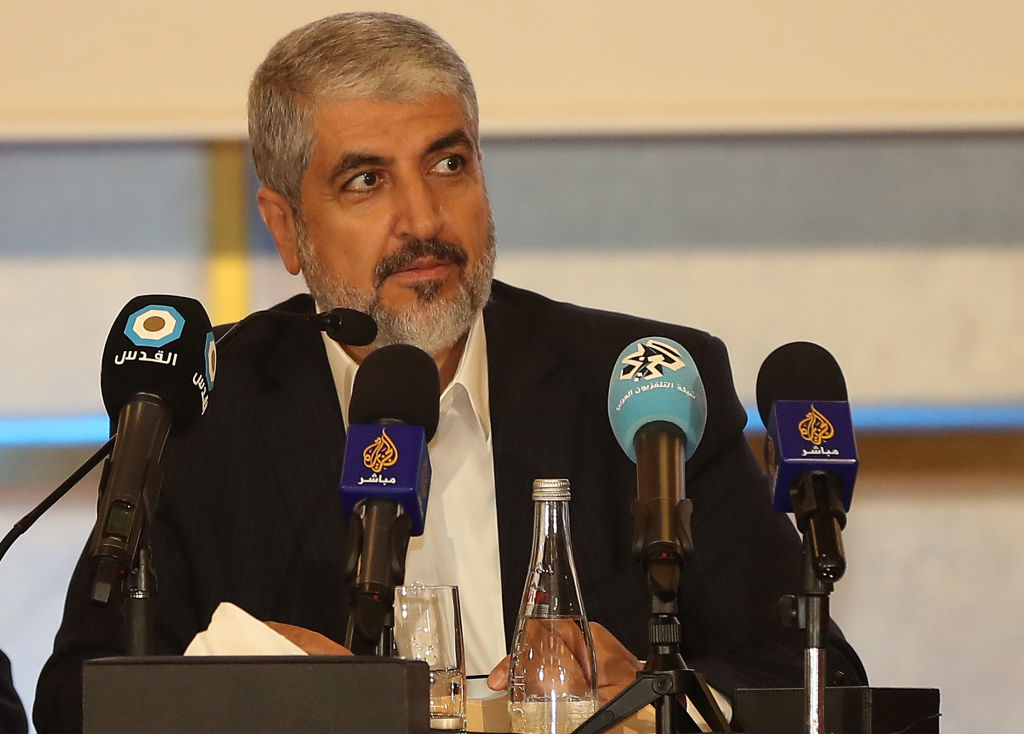Hamas drops demand that Israel be destroyed, amid growing Palestinian power struggle


A free daily email with the biggest news stories of the day – and the best features from TheWeek.com
You are now subscribed
Your newsletter sign-up was successful
On Wednesday, Palestinian Authority leader Mahmoud Abbas will meet with President Trump in the White House, as Trump begins a push to restart Israeli-Palestinian peace negotiations. On Monday, Hamas, the rival Palestinian faction to Abbas' Fatah, unveiled a newly revised charter that dropped the group's explicit call for Israel's destruction, distanced itself from the Muslim Brotherhood, formally accepted a provisional Palestinian state along the borders established by the 1967 Middle East war, and weakened anti-Jewish language from its 1988 charter, though Hamas did not renounce the goal of taking over the land now held by Israel or recognize Israel.
"This charter demonstrates our political vision and will be taught to our supporters," Hamas leader Khaled Mashaal said Monday in Doha, Qatar, where Hamas has its headquarters. "The 1988 charter represented our vision at that time and this one represents our vision now." Hamas, which is recognized as a terrorist organization by the U.S. and other Western nations, has controlled the Gaza Strip for a decade, while Fatah runs the West Bank. In moderating its tone, analysts say, Hamas is bidding for more international legitimacy and trying to edge into the role of dominant faction in the Palestinian Liberation Organization (PLO), which represents all Palestinians in international organizations. Fatah recognizes Israel.
Abbas is 82 and unpopular, and Fatah leaders are openly vying to succeed him, but while Hamas could gain popularity in the Palestinian territories, analysts say, Israel and the U.S. are unlikely to view the group much differently. The official moderation is "an attempt to grab market share," Jonathan Schanzer at the Foundation for Defense of Democracies tells The Wall Street Journal. "It's a very calculated shift, but I think the Trump administration is not going to see Hamas any differently ... it's a softening of rhetoric, not a change of behavior." Israeli Prime Minister Benjamin Netanyahu has pointed to the divide between Hamas and Fatah as a reason not to reopen peace negotiations.
The Week
Escape your echo chamber. Get the facts behind the news, plus analysis from multiple perspectives.

Sign up for The Week's Free Newsletters
From our morning news briefing to a weekly Good News Newsletter, get the best of The Week delivered directly to your inbox.
From our morning news briefing to a weekly Good News Newsletter, get the best of The Week delivered directly to your inbox.
A free daily email with the biggest news stories of the day – and the best features from TheWeek.com
Peter has worked as a news and culture writer and editor at The Week since the site's launch in 2008. He covers politics, world affairs, religion and cultural currents. His journalism career began as a copy editor at a financial newswire and has included editorial positions at The New York Times Magazine, Facts on File, and Oregon State University.
-
 The world’s most romantic hotels
The world’s most romantic hotelsThe Week Recommends Treetop hideaways, secluded villas and a woodland cabin – perfect settings for Valentine’s Day
-
 Democrats push for ICE accountability
Democrats push for ICE accountabilityFeature U.S. citizens shot and violently detained by immigration agents testify at Capitol Hill hearing
-
 The price of sporting glory
The price of sporting gloryFeature The Milan-Cortina Winter Olympics kicked off this week. Will Italy regret playing host?
-
 Nobody seems surprised Wagner's Prigozhin died under suspicious circumstances
Nobody seems surprised Wagner's Prigozhin died under suspicious circumstancesSpeed Read
-
 Western mountain climbers allegedly left Pakistani porter to die on K2
Western mountain climbers allegedly left Pakistani porter to die on K2Speed Read
-
 'Circular saw blades' divide controversial Rio Grande buoys installed by Texas governor
'Circular saw blades' divide controversial Rio Grande buoys installed by Texas governorSpeed Read
-
 Los Angeles city workers stage 1-day walkout over labor conditions
Los Angeles city workers stage 1-day walkout over labor conditionsSpeed Read
-
 Mega Millions jackpot climbs to an estimated $1.55 billion
Mega Millions jackpot climbs to an estimated $1.55 billionSpeed Read
-
 Bangladesh dealing with worst dengue fever outbreak on record
Bangladesh dealing with worst dengue fever outbreak on recordSpeed Read
-
 Glacial outburst flooding in Juneau destroys homes
Glacial outburst flooding in Juneau destroys homesSpeed Read
-
 Scotland seeking 'monster hunters' to search for fabled Loch Ness creature
Scotland seeking 'monster hunters' to search for fabled Loch Ness creatureSpeed Read
